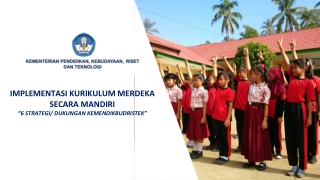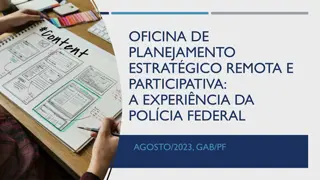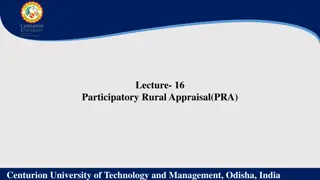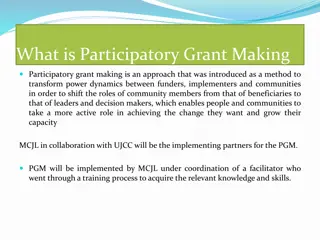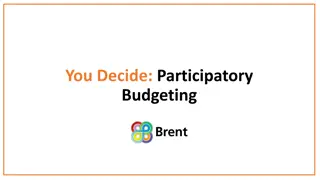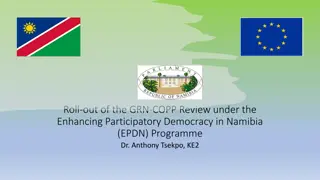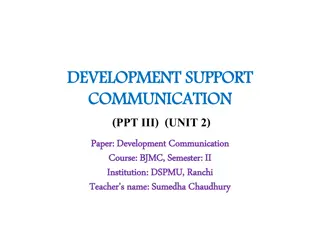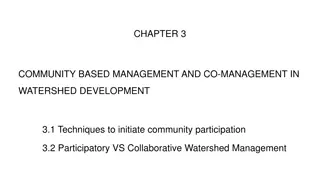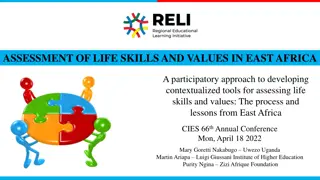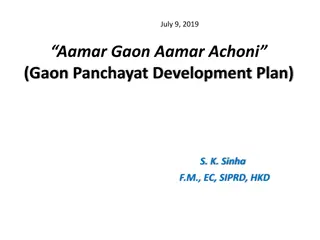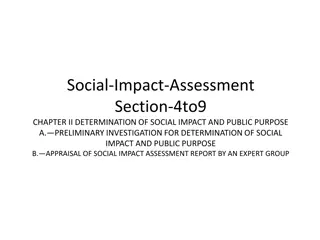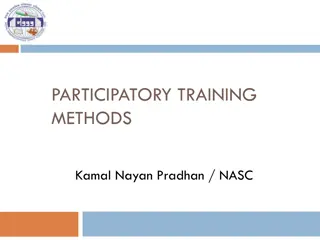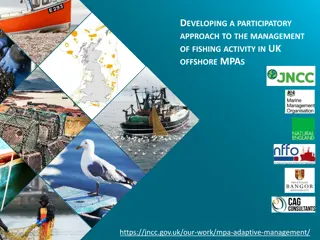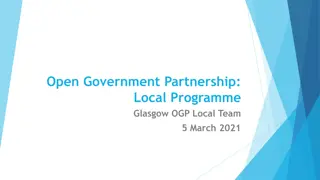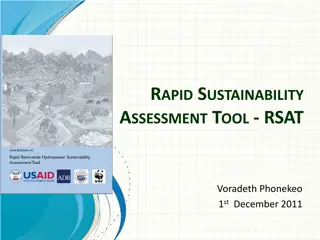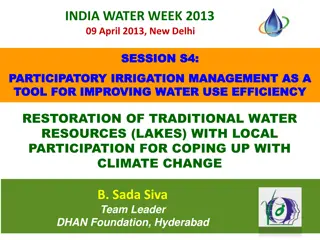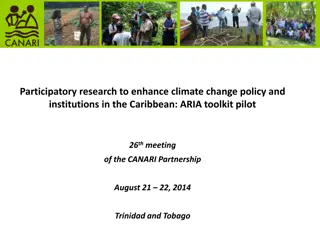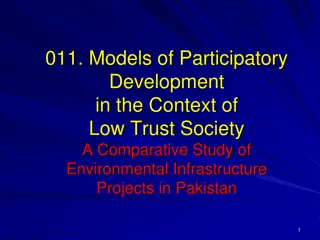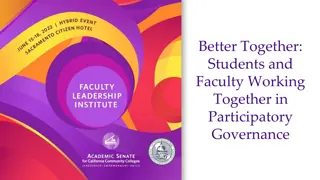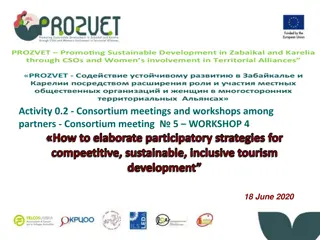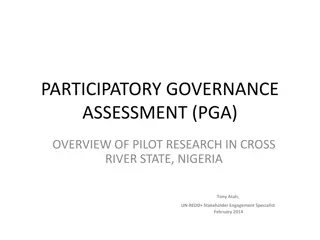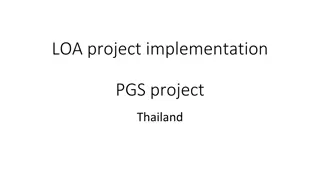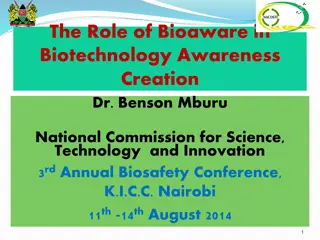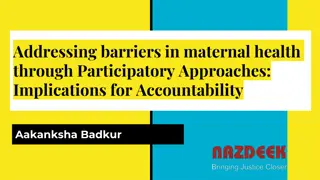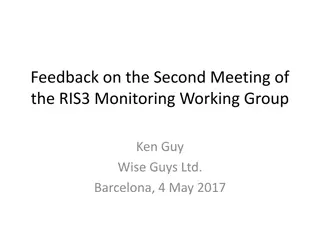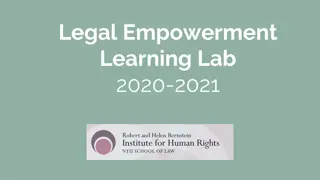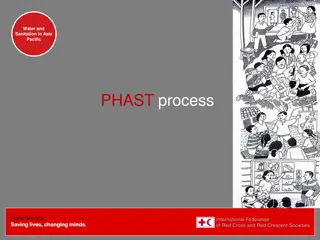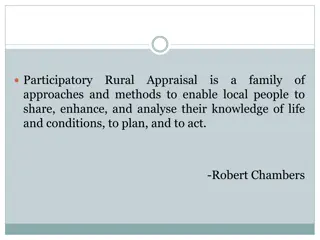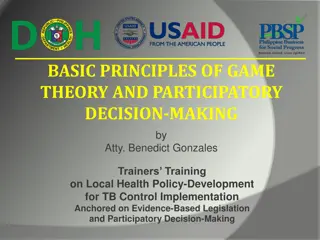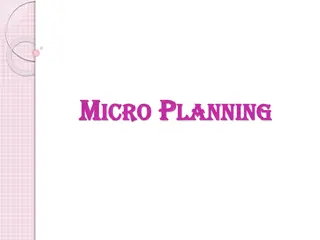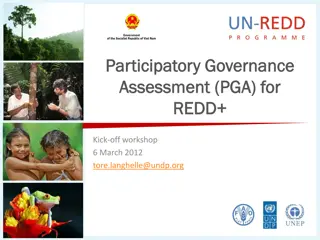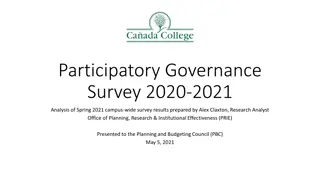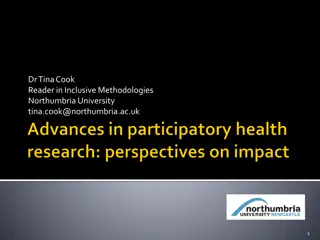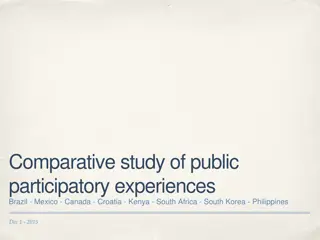National Smart Slum Upgrading and Prevention Strategy in Uganda
The National Smart Slum Upgrading and Prevention Strategy in Uganda addresses the challenges faced by slum residents, focusing on improving living conditions, preventing future slum growth, and integrating participatory measures for sustainable development. The strategy outlines the context of slum
0 views • 55 slides
Implementing Curriculum Merdeka Independently with Kemendikbudristek's Support
The current shift in curriculum includes a change in Kemendikbudristek's strategies for implementing the Gradual Independent Curriculum Merdeka. Schools now utilize a self-registration mechanism through the Merdeka Mengajar platform and engage stakeholders via community learning ecosystems. Teachers
3 views • 39 slides
Community-Based Participatory Research for Hard-to-Reach Populations: A Collaborative Approach
This presentation focuses on community-based participatory research for hard-to-reach populations, particularly on implementing harm reduction strategies for amphetamine-type stimulant (ATS) use. It addresses community engagement, outreach to hidden sites, societal perceptions of drug use, and the c
0 views • 25 slides
Remote and Participatory Strategic Planning Workshop Experience at the Federal Police Agency
In August 2023, the Federal Police Agency conducted a remote and participatory strategic planning workshop aimed at implementing the PF80 Project, diagnosing institutional problems from the perspective of employees, receiving proposals, and initiating the strategic planning process. The workshop inv
0 views • 41 slides
Community-Based Research Initiatives in Broward County
Explore the collaborative efforts and initiatives in Broward County focusing on youth mental health, care coordination, and community empowerment through participatory action research. Key organizations like the Children's Services Council play a vital role in enhancing the lives of children and fam
2 views • 22 slides
Understanding Participatory Rural Appraisal (PRA) at Centurion University
Participatory Rural Appraisal (PRA) is a methodology involving the local community in assessing resources, identifying problems, and creating action plans. This intensive learning experience is carried out by a multidisciplinary team at Centurion University, Odisha, India, emphasizing active partici
0 views • 8 slides
Transformative Approach: Participatory Grant Making for Community Empowerment
Participatory grant making (PGM) is a method aimed at reshaping power dynamics within funding processes, shifting community members from beneficiaries to decision-makers. MCJL and UJCC collaborate to implement PGM, enabling community-led initiatives for change and capacity building. Through a facili
0 views • 9 slides
Empowering Community Decision-Making with Participatory Budgeting
Participatory Budgeting (PB) empowers local residents to directly influence how public funds are spent on community projects. Through stages like information sharing, application submission, and voting, programs like CO2GO and NCIL aim to engage diverse communities in decision-making for a sustainab
0 views • 21 slides
Enhancing Participatory Democracy in Namibia: EPDN Programme Review
The EPDN Programme aims to enhance participatory democracy in Namibia by strengthening collaboration between Civil Society Organizations, Government, and Parliament in education, skills, and rural development sectors. Specific tasks include assisting in the implementation of the Civic Organisations
0 views • 8 slides
Evolution of Development Communication Paradigms and Alternative Paradigm
Development Communication explores the stages of creating a plan, implementing strategies, and ownership paradigms in development projects. Emphasis is on participatory approaches, community empowerment, and inverting top-down processes. The concept of Alternative Paradigm emerges to counter the ali
0 views • 6 slides
Community-Based Management in Watershed Development
Techniques to initiate community participation in watershed management are crucial for sustainable development. Scholars classify participation levels into different categories, highlighting the importance of ideological motivation and voluntary engagement. The shift from direct intervention to part
0 views • 28 slides
Assessing Life Skills and Values in East Africa: A Participatory Approach
Life skills education is crucial for children's development, yet its assessment varies across cultures. The ALiVE initiative in East Africa aims to enhance system capacities for assessing life skills and values. The ALiVE tool development process involved prioritization, contextualization, literatur
0 views • 7 slides
Empowering Rural Development through GPDP: A Comprehensive Approach
The 73rd amendment of the Indian Constitution established Panchayats as local self-governing bodies, aimed at promoting grassroots democracy in rural areas. The Gaon Panchayat Development Plan (GPDP) serves as a tool for holistic village development, empowering local governance institutions to imple
0 views • 37 slides
Implementing NDCs Through NAMAs: Drivers, Needs & Opportunities
This content discusses Nationally Appropriate Mitigation Actions (NAMAs) as a vehicle to implement Nationally Determined Contributions (NDCs), highlighting success factors, guiding questions, and lessons from the Clean Development Mechanism (CDM). It covers the role of NAMAs in achieving sustainable
0 views • 21 slides
Understanding Social Impact Assessment Process
Social Impact Assessment (SIA) is a crucial process that analyzes, monitors, and manages the social consequences of developments to assess their effects on quality of life and wellbeing. It aims to identify both positive and negative impacts, involving individuals, groups, and communities in decisio
0 views • 15 slides
Participatory Training Methods Overview
Explore participatory training methods including interactive lecture, case study, and critical incident methods. Features include learning through experiences, adapting content based on participant feedback, and promoting inclusiveness. Learn how to select training methods based on objectives, time,
0 views • 14 slides
Developing a Participatory Approach to Fisheries Management in UK Offshore MPAs
The 2-year project launched in April 2018 aims to address uncertainty around fishing impacts in offshore environments by engaging key stakeholders through Adaptive Management. The project focuses on developing a consistent approach for managing sedimentary habitats in light of scientific uncertainty
2 views • 15 slides
Co-evolution of Coastal Human Activities and Mediterranean Natural Systems for Sustainable Tourism
The kick-off meeting focused on the co-evolution of coastal human activities and Mediterranean natural systems for sustainable tourism in the Mediterranean region. Stakeholder involvement in developing local action plans was emphasized through participatory processes, aiming to address real needs an
0 views • 23 slides
Open Government Partnership: Local Programme in Glasgow
The Open Government Partnership (OGP) Local Programme in Glasgow aims to promote transparent, participatory, inclusive, and accountable governance by bringing together governments, citizens, and civil society organizations. Through collaborative efforts, the program focuses on key policy themes such
4 views • 11 slides
Rapid Sustainability Assessment Tool (RSAT) for Hydropower Development in the Mekong River Basin
The Rapid Sustainability Assessment Tool (RSAT) is a methodology designed to assist in sustainable hydropower development in the Mekong River Basin. It utilizes participatory SWOT analysis, multi-stakeholder dialogue, evidence-based scoring, and gap analysis for decision-making. RSAT evaluates singl
2 views • 12 slides
Participatory Irrigation Management for Improved Water Use Efficiency and Climate Change Adaptation
DHAN Foundation in Hyderabad is implementing participatory irrigation management for enhancing water use efficiency and restoring traditional water resources like lakes with local participation. The focus is on conservation and development of traditional irrigation tanks to promote livelihoods, maxi
0 views • 11 slides
Enhancing Climate Change Policy in the Caribbean through Participatory Research: ARIA Toolkit Pilot
Strong efforts are being made to enhance climate change policy and institutions in the Caribbean through a participatory research project. Funded by CDKN, the project aims to improve the capacity of Caribbean islands to develop and implement effective climate change adaptation policies. The ARIA too
0 views • 18 slides
Participatory Development and Trust Building in Low-Trust Societies
Models of participatory development in low-trust societies highlight the failure of government-led approaches due to inequalities and distrust between government agencies and communities. Breaking this vicious circle requires establishing equitable partnerships and ensuring equal roles in planning a
0 views • 19 slides
Enhancing Student-Faculty Collaboration in Participatory Governance
Explore the significance of students and faculty working together in participatory governance within educational institutions. Learn about the history, value, and benefits of participatory governance, as well as the roles and responsibilities of various stakeholders. Discover how this collaborative
0 views • 21 slides
Developing Participatory Strategies for Sustainable Tourism Growth
Explore the key topics discussed in a workshop focusing on developing participatory strategies for competitive, sustainable, and inclusive tourism development. Topics include the pillars of strategy elaboration, vision and mission, market positioning, Protvez methodology, and a case study on the Umb
0 views • 22 slides
Enhancing Participatory Governance for Sustainable Forest Management in Cross River State, Nigeria
This overview outlines the objectives, principles, geographic coverage, and technical aspects of the Participatory Governance Assessment (PGA) pilot research conducted in Cross River State, Nigeria in 2014. The PGA aimed to evaluate legal instruments, institutional capacity, community participation,
0 views • 18 slides
Participatory Governance Assessments in REDD+ and Global Democratic Governance Programmes
This content explores the concept of Participatory Governance Assessments (PGA) in the context of REDD+ initiatives, highlighting its objectives, value-added benefits, typical processes, and alignment with other governance indicators. It delves into examples from different countries like Indonesia,
0 views • 12 slides
Promoting Participatory Guarantee Systems (PGS) for Small Scale Organic Farming in Thailand
The project aims to strengthen organic agriculture communities in Thailand through the establishment of Participatory Guarantee Systems (PGS) as an alternative to third-party certification. PGS advocates for market and government recognition, focusing on quality assurance, trust, and knowledge excha
0 views • 13 slides
Role of Bioaware in Biotechnology Awareness Creation
Bioaware, the national biotechnology awareness strategy hosted at NACOSTI, aims to provide a participatory mechanism for creating awareness about the role of biotechnology in Kenya's development agenda. It seeks to impart knowledge of biotechnology and its products to human health and the environmen
0 views • 16 slides
Addressing Barriers in Maternal Health: A Participatory Approach for Accountability
This research focused on addressing barriers in maternal health through participatory approaches due to low utilization of existing maternal health services, poor quality of care, strain on public health infrastructures, under-reporting, and long-term impacts of the pandemic. The intervenor, a legal
0 views • 16 slides
Insights from RIS3 Monitoring Working Group Meeting at Ken Guy Wise Guys Ltd.
The feedback from the second meeting of the RIS3 Monitoring Working Group at Ken Guy Wise Guys Ltd. in Barcelona highlighted key tasks, including presentations on monitoring exercises, participatory exercises, and the RIS3 Monitoring Clinic. The presentation emphasized humor in communication, while
0 views • 5 slides
Navigating Challenges in Participatory Research: Strategies Against Delegitimation
Delve into the complexities of participatory research as this article explores strategies to combat delegitimation in community-based work, highlighting methods to empower and amplify marginalized voices against dismissive practices.
0 views • 10 slides
Water and Sanitation in Asia Pacific: Community Planning for Health Improvement
The article discusses the PHAST process (Participatory Hygiene and Sanitation Transformation) in Asia Pacific, focusing on seven steps for community planning to prevent diarrhoeal diseases. It covers problem identification, analysis, planning for solutions, selecting options, monitoring, evaluation,
0 views • 19 slides
Understanding Participatory Approaches in Rural Appraisal
Participatory Rural Appraisal (PRA) is a methodology focusing on enabling local communities to share, enhance, and analyze their knowledge to plan and take action. Originating as Rural Rapid Appraisal (RRA) in the 1970s, PRA emphasizes participation, shared visual representations, and empowerment of
1 views • 23 slides
Principles of Participatory Decision-Making in Local Health Policy Development
Participatory decision-making involves giving stakeholders a voice in interventions, welcoming diverse perspectives, and avoiding domination by any individual or group. Challenges such as excluding certain groups or rubber-stamping ideas need to be addressed to ensure a truly participatory process.
0 views • 26 slides
Empowering Communities Through Micro Planning for Forest Development
Micro Planning is a community-based process empowering forest-dependent communities to create a roadmap for sustainable development. Joint Forest Management Committees and other bodies organize the preparation of ten-year development plans prioritizing activities for enhanced livelihoods. The proces
0 views • 15 slides
Participatory Governance Assessment (PGA) for REDD+ Workshop Overview
This document provides insights into the Kick-off workshop for the Participatory Governance Assessment (PGA) for REDD+ in Vietnam. It outlines the objectives, agenda, significance of PGA for REDD+ in Vietnam, pilot phase details, stakeholder involvement, and workshop objectives. Key topics include t
0 views • 9 slides
Spring 2021 Campus-wide Participatory Governance Survey Analysis
Analysis of the 2020-2021 Participatory Governance Survey results conducted on campus in Spring 2021, presented by Alex Claxton to the Planning and Budgeting Council on May 5, 2021. The report includes insights on the response rate and key findings from the survey.
0 views • 19 slides
Key Issues in Participatory Health Research
This content discusses the importance of articulating the impact of participatory research, highlighting the need for improvement in articulation and how communities of participatory health researchers are addressing these issues. It explores paradigms, underlying assumptions, and the fundamental im
0 views • 26 slides
Comparative Study of Public Participatory Experiences in Various Countries
This study compares public participatory experiences in Brazil, Mexico, Canada, Croatia, Kenya, South Africa, South Korea, and the Philippines, evaluating how each case defines public participation, distinguishes between access to budget information and participation processes, and categorizes insti
0 views • 13 slides

